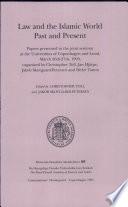
Democracy in Islamic and International Law
Following the rise of Islamic fundamentalism, Muslim nations have been placed in the spotlight of international debate; the prevailing understanding is that democracy and Islam are fundamentally incompatible. This verdict is particularly damning in light of the trend in International Law which, since the collapse of communism in Eastern Europe, has equated democracy with human rights. Yet, a thorough analysis of the debate, taking into account the historical and theoretical bases of liberal democracy — the cultural, legal, and political development of Islam, and the extent to which the politics of Islamic countries represents the politics of Islam — reveals that democracy and Islam are, in fact, fundamentally compatible. In practice, Islamic Law can be applied alongside developments in democratic representations and human rights.
- ISBN 13 : 9781456740658
- ISBN 10 : 1456740652
- Judul : Democracy in Islamic and International Law
- Pengarang : Ibrahim S Alharbi,
- Kategori : Law
- Penerbit : AuthorHouse
- Bahasa : en
- Tahun : 2011
- Halaman : 348
- Google Book : https://play.google.com/store/books/details?id=XA8FxZk5wFMC&source=gbs_api
-
Ketersediaan :
Dr. Ibrahim S Alharbi. Abstract Following the rise of Islamic fundamentalism,
Muslim nations have been placed in the spotlight of international debate; the
prevailing understanding is that democracy and Islam are fundamentally
incompatible.









